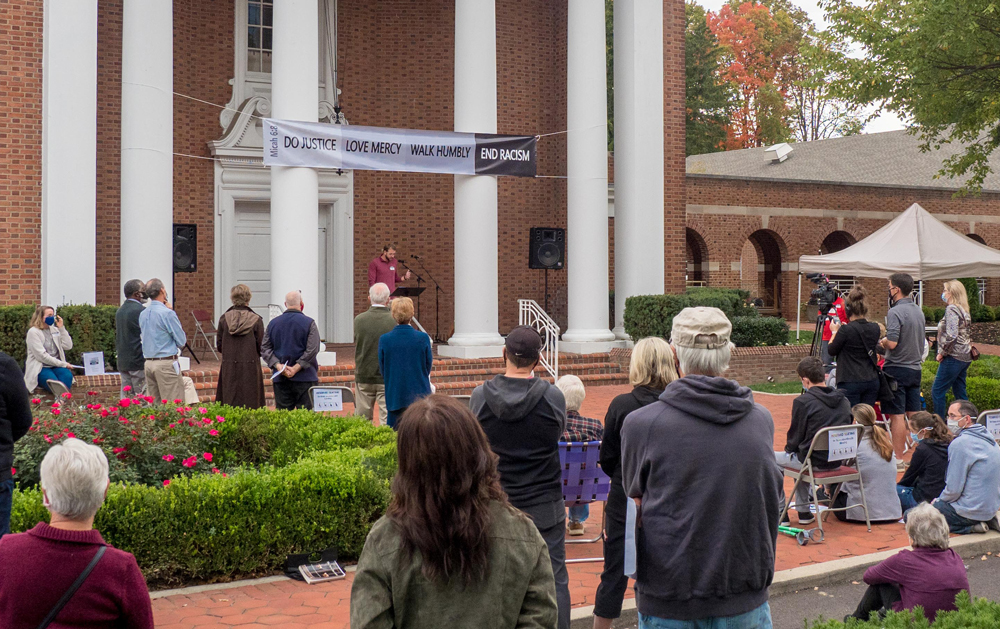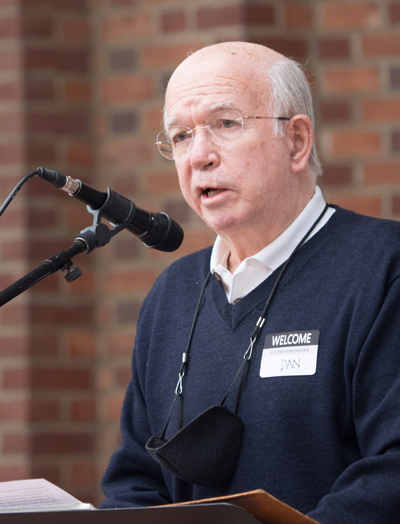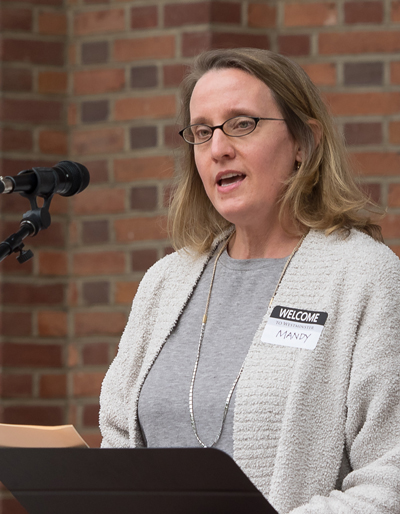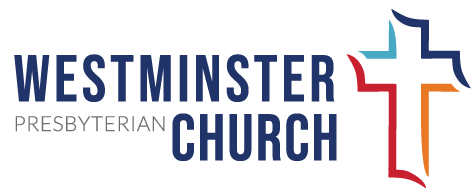
On the afternoon of World Communion Sunday, the Westminster community gathered in front of the church and pledged to work to end racism in our community and society. Through scripture, prayers, and hymns, the Lord’s requirement of us was clear: “to do justice, and to love kindness, and to walk humbly” with our God. The following statements from the program help tell the continuing story at Westminster’s commitment to loving our neighbors and working for justice.
Dan Paul: Westminster’s Work in Homewood

The theme for Westminster’s Faith Witness was “Do Justice, Love Mercy, Walk Humbly, End Racism.” This is exactly what Westminster is doing in Pittsburgh’s poorest community, Homewood.
For the past seven years Westminster has been at the forefront of the renaissance underway in Homewood, which is protecting its most vulnerable residents. This sets it apart from redevelopment in all other communities which have left residents behind. Many call this gentrification. Avoiding gentrification is a top priority for us because 45% of Homewood’s residents live in poverty and 66% of its children do.
Westminster has played a leadership role in shaping this truly exciting revitalization initiative for the people of Homewood. We’ve worked with a team of five black folks and five white folks; this team has held 45 meetings in Homewood and has worked in partnership with the nine leaders of Homewood’s nonprofits, which is called the Collaborative. We’ve also worked with leaders of local government, foundations, and corporations like UPMC, PNC, Highmark, the Allegheny Conference, and 26 other key influencers. They have all been highly supportive. A top UPMC executive told us:
"I applaud your efforts to bring stakeholders from across Pittsburgh together to have this kind of cohesive impact in Homewood on behalf of Homewood’s residents, Pittsburgh, and the country. The time has come to take community development to the next level as you are doing. You’ve proven this is possible, so its power in Homewood will be a role model for many other communities. Everyone should universally embrace what you're doing; it's amazing."
Homewood has become Mayor Peduto’s top priority for rebuilding African American communities in Pittsburgh. He believes this will be a role model for other communities both here and across the country. We call it the Hope in Homewood Campaign.
This work is a reflection of what our faith tells us about service. Love our neighbor; what you've done for the least of these you've done for me; and where your heart is, there your treasure will be. God’s message to us about serving others is clear, or as Bruce has told us, these are not complicated instructions.
Westminster has long shown an eagerness to make progress in social justice: One hundred forty members attended House of Manna in Homewood. Twenty-six members volunteered for nine months to help Eugene and Dina Blackwell launch their nonprofit. Four years ago, a group from Westminster joined the Grace Book Club, hosted by Grace Memorial Presbyterian Church in the Hill District, to discuss books on racial justice. Faith in Life discussed many of these same books on race for over ten years. John Wallace gave three sermons and a seminar on Homewood at Westminster. His first sermon was on privilege. It received vigorous applause which, as you know, almost never happens.
And because of all this, Westminster has become a role model for other churches: Pittsburgh Presbytery has five task forces on race; Bob Dilly and I have participated in one of them. These five groups have talked and talked for years but haven’t made much real progress. Sheldon Sorge, general minister to the presbytery, tells me that Westminster’s work in Homewood is moving the needle on systemic racism and social justice more than any other activity in the presbytery.
For 65 years I struggled with my faith. Homewood has changed everything for me. It’s given me purpose, humility, and joy beyond anything I had imagined. I have truly been blessed with the opportunity to do God's work in Homewood. I hope you will join us.
Mandy Thomas: Westminster and South Hills Interfaith Movement

Today I speak to you both as a member of Westminster Presbyterian and as a member of the Board of Directors of SHIM, the South Hills Interfaith Movement. I am only one of a long line of Westminster Board members selected to ensure strong ties between the two organizations. Social justice has been woven into the fabric of SHIM over our more than 53-year history. Rev. Galbreath met with a rabbi and a priest, and together they founded SHIM in 1967 – the year before Martin Luther King Jr. was assassinated, and two short years after Rev. Galbreath went to Selma with MLK.
SHIM has coordinated many social justice programs during our history including an eRacism program in the late 80s and early 90s and the Fall Peace & Justice Program and the Festival of Cultures in the early 2000s. We also held Martin Luther King Jr. Unity Celebrations for several consecutive years in the 90s and 2000s.
Today, SHIM’s programming focuses primarily on the poor with emphasis on foreign-born, largely refugee individuals and families. As the South Hills has grown in racial and ethnic diversity, SHIM’s programming surrounding that population has as well. Of the 7,500 individuals that SHIM serves annually, more than 50% are of a minority race or ethnicity. Pittsburgh has the largest concentration of Bhutanese/Nepalese refugees in the United States, for example, and many of them are served by SHIM.
SHIM now serves individuals from over 25 countries speaking over 30 different languages and dialects, all with strong and consistent support from Westminster. The mentoring program, which partners willing volunteers (including some Westminster members) with small groups of refugee youth, has helped lead to incredible stories of first generation Americans going to college for engineering, for example. While many of these people fled their countries for fear of persecution, and are extremely grateful for the opportunities afforded by living in the United States, they still face discrimination in housing, employment, and education. So SHIM works every day to help encourage and support them, and thus by extension, Westminster does as well.
SHIM is proud to support all our neighbors, regardless of their race, ethnicity, or socio-economic status. And we are proud of our shared heritage with Westminster Presbyterian Church doing justice, loving mercy, and walking humbly with God.
